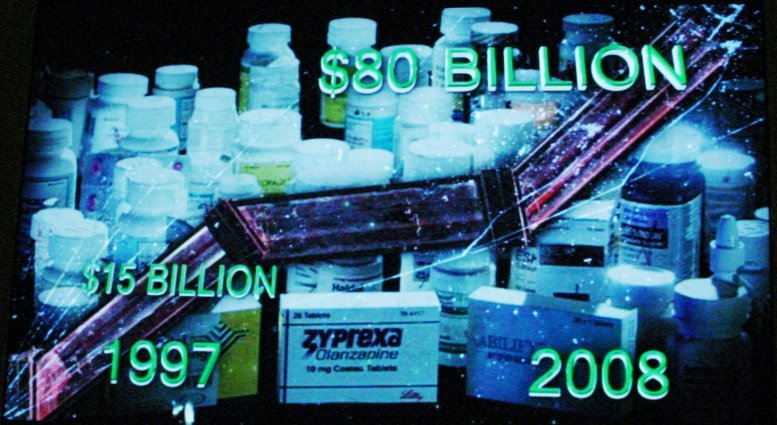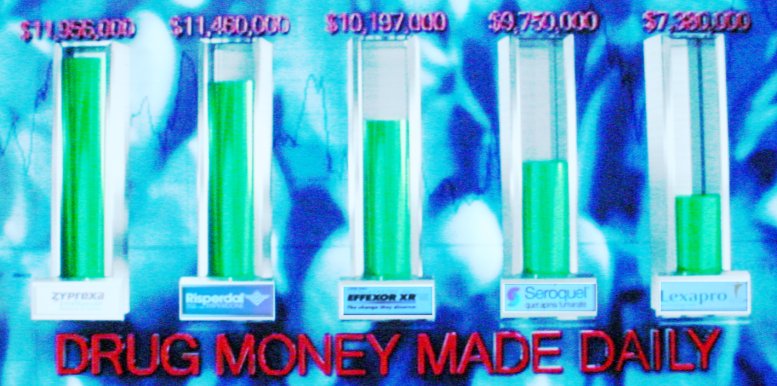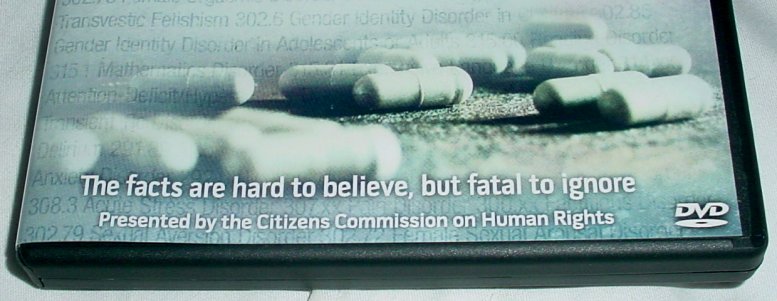At the Mountain View Art & Wine
Festival I always try to spend an hour or two in the free speech zone,
partly to find out what other people care enough about to invest their
time there. This year there were some
people there with an issue I'd never seen formally presented before.
They went by the name "Citizens Commission on Human Rights", and were
quietly handing out DVD's titled Making A Killing. I asked what it was
about, and the woman said something about how way too many drugs are
being prescribed way too frequently. She gave me the DVD and said "show
it to your friends if you like it."
The movie begins by explaining that as
recently as 1967, psychiatry wasn't really a respected medical
profession. That changed when they developed some formal techniques for
diagnosing common human conditions
as diseases. Things like mood swings and post partum depression. Then
the pharmaceutical industry figured out that they could sell everybody
who'd been diagnosed with one or more of these conditions a steady
stream of drugs to treat it/them. Then in the '90s the pharmaceutical
industry got approval to advertise directly to the public, and since
then usage has really mushroomed.

Partly this is because almost anything
can be diagnosed as a mental disorder. The film makers got a random
sampling of people to take an
online quiz, and half of them turned out to have symptoms requiring
further analysis. It is also because drug companies reward
psychiatrists
for prescribing lots of drugs. Things like free tickets to seminars on
nice tropical islands for themselves and a guest, all expenses paid.
This is a big industry. Every year $330
Billion is spend on drugs like Zyprexa,
Risperdal, Effexor, Seroquel, and Lexapro each have more than $7
Million
spent on them in an average day. Since the drug companies started
direct
to consumer advertising (those adds that suggest you have a problem and
ask that you talk to your doctor and "ask about Lavitra" or whatever)
in
the 1990s the sales have multiplied dramatically. Drug companies now
spend $2.9 Billion on direct advertising, a sizable percentage of their
estimated $5.9 annual marketing budgets. There is even a revolving door
that connects the psychiatrists, drug companies, regulators, lobbiests,
and the media that cover
them.

The side effects of these drugs can
hurt or kill people. The film estimates more people die every month as
a result of drug side effects than were ever killed by the 9/11 attack
in New York. They also said more people commit suicide while medicated
than get killed in homicides.
There was a dramatic sequence where they played footage I'd seen on TV
from various mass murders and then listed the drugs the killers were on
at the time. They cut to a talking head who said "we didn't have this
kind of problem back before these drugs were widely prescribed."
The movie finished with a few
suggestions about how to fight back. The
key is informed consent. Start by asking "How do you know I need this
drug?", "What happens if I don't take this drug?", and "What other
treatment options are available?" If you have bad side effects, be sure
to
report them to MedWatch, a passive government data collection portal.
Back when I was a teenager my Dad had
good insurance. I found out about
this by not sleeping for a few days as a homeless teenager that didn't
know the rules and going off the deep end. I woke up in a psychiatric
hospital. At first they were just going to keep me for a couple of
days,
but then they found out about the huge limits on my Dad's policy. I was
locked up for six months. I don't doubt at all the shocking storys
above.
I've lived through an experience that confirms a lot of the patterns in
it. I was surprised by how big the psychiatric-industrial complex has
grown since then (1977) though.
The other thought I had was that all
that hand wringing about the rising
cost of our medical system is partly caused by this problem. Maybe we
can solve part of that by stopping drug advertising on TV. Maybe we can
keep some
easily led people from wanting a prescription. Why would they advertise
for drugs if it didn't work?
Anyhow, this is an eye opening movie.
There are disturbing stories in it I didn't put in this
email. You can find out more at:



